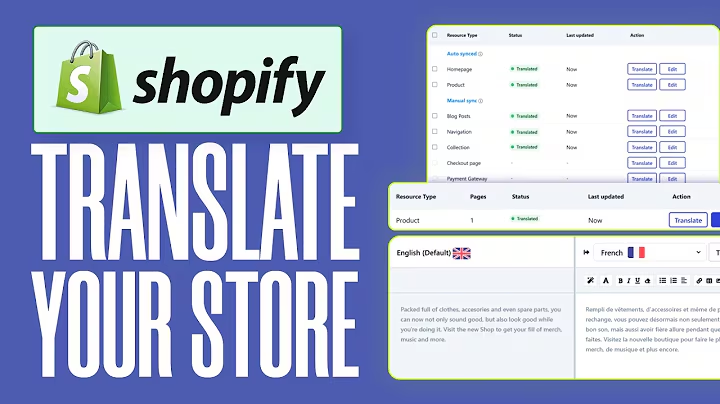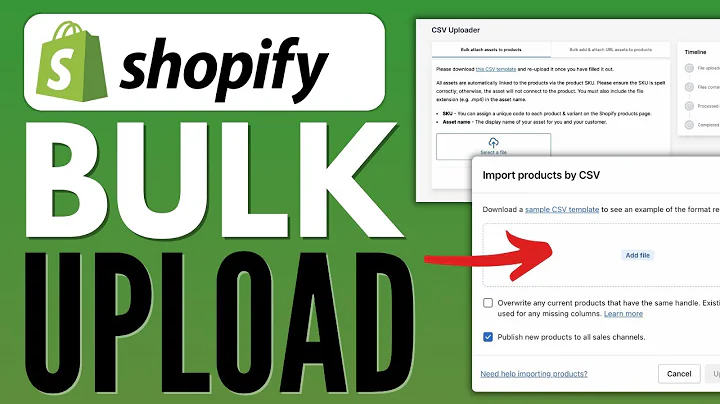Effortlessly Import Sales Orders and Customers with Shopify-NetSuite Connector
Table of Contents:
- Introduction
- The Shopify - NetSuite Connector
- Editions of the Connector
3.1 Standard Edition
3.1.1 Data Flows
3.2 Premium Edition
3.2.1 Data Flows
3.3 Enterprise Edition
3.3.1 Data Flows
- Importing Customers and Sales Orders from Shopify to NetSuite
4.1 Placing an Order on the Front End of the Website
4.2 Executing the Data Flow
4.3 Reviewing the Sales Order in NetSuite
4.4 Comparing the Customer Record in NetSuite and Shopify
- The Integrated Oroli Platform
5.1 Dashboard
5.2 Settings
- Conclusion
Introduction
Welcome to Nava Module, your home for smart cloud integrations. In this article, we will be discussing the functionality of one of the most popular webstore connectors, the Shopify - NetSuite Connector.
The Shopify - NetSuite Connector
The Shopify - NetSuite Connector is a cloud DLP system that integrates Shopify with NetSuite. It allows for seamless data transfer between the two platforms, making it easier for businesses to manage their e-commerce operations.
Editions of the Connector
There are three editions of the Shopify - NetSuite Connector: Standard, Premium, and Enterprise. Each edition offers different features and data flows to cater to the specific needs of businesses.
Standard Edition
The Standard Edition of the connector includes four data flows that allow you to import customers and sales orders from Shopify to NetSuite. You can also export fulfillment data and inventory levels from NetSuite to Shopify.
Premium Edition
The Premium Edition includes two additional data flows that allow you to export items from NetSuite to Shopify, along with pertinent billing information.
Enterprise Edition
The Enterprise Edition has two additional data flows, enabling you to export cancellations and refunds from NetSuite to Shopify.
Importing Customers and Sales Orders from Shopify to NetSuite
To import customers and sales orders from Shopify to NetSuite, you need the front end of the store and the Shopify - NetSuite Integrated.io platform.
Placing an Order on the Front End of the Website
To demonstrate the data flow, we will place an order on the front end of the Shopify website. We will add items to the cart, provide customer and shipping information, and complete the order.
Executing the Data Flow
Once the order is completed, the data flow will be executed on the back end of the Integrated Oroli platform. The connector will import order and customer information from Shopify to NetSuite.
Reviewing the Sales Order in NetSuite
After the data flow is completed, we can see the imported sales order in NetSuite. We can view details such as customer information, sales order number, items purchased, and billing and shipping addresses.
Comparing the Customer Record in NetSuite and Shopify
We can compare the customer record in NetSuite with the record in Shopify. Both platforms contain unique identifiers and relevant information about the customer.
The Integrated Oroli Platform
The Integrated Oroli platform is where the Shopify - NetSuite Connector is located. It provides a dashboard and settings for managing the connector and data flows.
Dashboard
The dashboard on the Integrated Oroli platform displays the progress of executed data flows. It gives an overview of all the data flows that have been executed.
Settings
The settings section allows users to configure the data flows available to them based on the edition of the connector they have purchased.
Conclusion
The Shopify - NetSuite Connector offers a seamless integration between Shopify and NetSuite, allowing businesses to efficiently manage their e-commerce operations. With different editions and data flows, businesses can choose the connector that best fits their needs.
Article:
The Shopify - NetSuite Connector: Seamless Integration for E-commerce Operations
Welcome to Nava Module, your go-to platform for smart cloud integrations. In this article, we will explore the functionality and features of one of the most popular webstore connectors - the Shopify - NetSuite Connector. This cloud DLP system integrates Shopify with NetSuite, providing businesses with a seamless way to manage their e-commerce operations.
Editions of the Connector
The Shopify - NetSuite Connector is available in three editions: Standard, Premium, and Enterprise. Each edition offers different features and data flows to cater to the specific needs of businesses.
Standard Edition
The Standard Edition of the connector provides four essential data flows. It enables businesses to import customers and sales orders from Shopify to NetSuite effortlessly. Additionally, it allows the export of fulfillment data and inventory levels from NetSuite to Shopify.
Premium Edition
The Premium Edition includes all the features of the Standard Edition along with two additional data flows. With the Premium Edition, businesses can export items from NetSuite to Shopify, including pertinent billing information.
Enterprise Edition
The Enterprise Edition offers all the functionalities of the Premium Edition, with two additional data flows. Businesses using the Enterprise Edition can export cancellations and refunds from NetSuite to Shopify, ensuring seamless communication between the two platforms.
Importing Customers and Sales Orders from Shopify to NetSuite
To demonstrate the capabilities of the Shopify - NetSuite Connector, let's walk through the process of importing customers and sales orders from Shopify to NetSuite.
First, we need to access the front end of the Shopify store and the Shopify - NetSuite Integrated.io platform, where the connector resides.
Placing an Order on the Front End of the Website
To initiate the data flow, we will place an order on the front end of the Shopify website. By adding items to our cart, providing customer information, and completing the order, we trigger the import process.
Executing the Data Flow
Once the order is completed, the data flow is executed on the back end of the Integrated Oroli platform. The connector seamlessly imports order and customer information from Shopify to NetSuite, ensuring accuracy and efficiency.
Reviewing the Sales Order in NetSuite
After the data flow execution is complete, we can review the imported sales order in NetSuite. The sales order includes crucial details such as customer information, sales order number, items purchased, and billing and shipping addresses.
Comparing the Customer Record in NetSuite and Shopify
Comparing the customer record in NetSuite with Shopify sheds light on the synchronization between the two platforms. Each platform contains unique identifiers and relevant information about the customer, ensuring consistency across systems.
The Integrated Oroli Platform: Efficient Management of Connectors and Data Flows
The Integrated Oroli platform serves as the hub for your Shopify - NetSuite Connector. It provides a user-friendly dashboard that displays the progress of executed data flows. The dashboard offers an overview of all the data flows that have been executed, ensuring transparency and control.
Within the platform's settings, users can configure the data flows available to them based on the edition of the connector they have purchased. This allows businesses to tailor their connector experience and leverage the functionalities that align with their specific requirements.
In conclusion, the Shopify - NetSuite Connector revolutionizes e-commerce operations by seamlessly integrating Shopify with NetSuite. With different editions and a variety of data flows, businesses can choose the connector that best suits their needs. Experience the power of seamless integration and take your e-commerce operations to new heights with the Shopify - NetSuite Connector.
Highlights:
- The Shopify - NetSuite Connector seamlessly integrates Shopify with NetSuite, streamlining e-commerce operations.
- Three editions of the connector offer various features and data flows to cater to businesses' specific needs.
- Import customers and sales orders from Shopify to NetSuite effortlessly and efficiently.
- The Integrated Oroli platform provides a user-friendly dashboard and customizable settings for efficient management of the connector.
FAQ:
Q: What is the Shopify - NetSuite Connector?
A: The Shopify - NetSuite Connector is a cloud DLP system that integrates Shopify with NetSuite, enabling seamless transfer of data between the two platforms.
Q: What are the editions of the connector?
A: The connector is available in three editions: Standard, Premium, and Enterprise, each offering different features and data flows.
Q: Can I import customers and sales orders from Shopify to NetSuite?
A: Yes, the connector allows for easy and efficient import of customers and sales orders from Shopify to NetSuite.
Q: How does the Integrated Oroli platform support the connector?
A: The Integrated Oroli platform serves as the hub for the connector and provides a dashboard for monitoring and managing data flows. It also offers customizable settings based on the connector edition.
Q: Is the connector customizable to meet specific business requirements?
A: Yes, businesses can choose the edition of the connector that aligns with their needs and configure data flows accordingly.
Q: What are the key benefits of using the Shopify - NetSuite Connector?
A: The connector enables seamless integration between Shopify and NetSuite, streamlining e-commerce operations, and ensuring accurate data transfer.
Q: Can I track the progress of data flows?
A: Yes, the Integrated Oroli platform's dashboard allows users to monitor the progress of executed data flows, ensuring transparency and control.
Q: Does the connector support exporting data from NetSuite to Shopify?
A: Yes, depending on the edition, the connector allows for exporting fulfillment data, inventory levels, items, cancellations, and refunds from NetSuite to Shopify.
Q: How does the connector ensure data consistency between Shopify and NetSuite?
A: By importing and syncing customer and order information, the connector ensures data consistency between both platforms, providing a unified view of operations.
Q: Can I customize the connector mappings?
A: Yes, during the implementation process, the connector mappings can be customized to match the specific requirements of your business.













